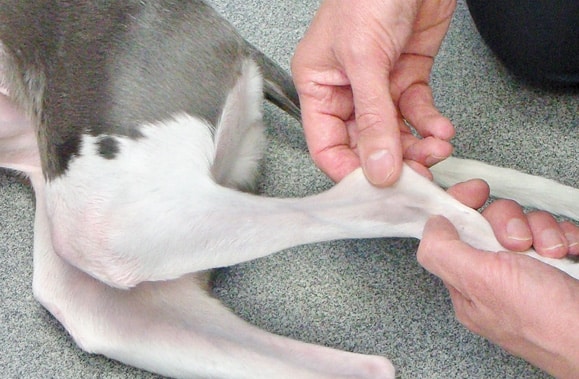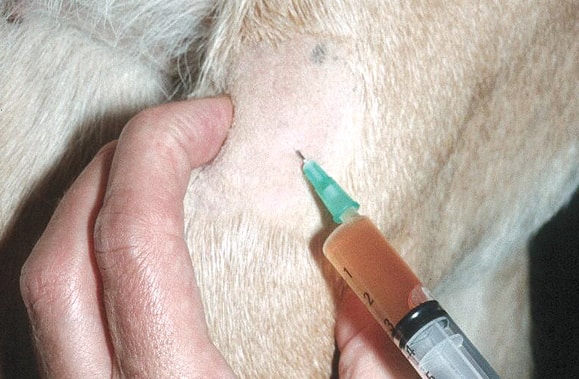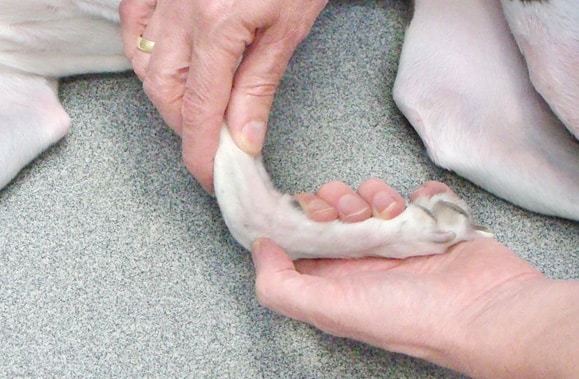
What is immune-mediated polyarthritis?
Immune-mediated polyarthritis is a disorder of the immune system (which normally fights off infections) leading to inflammation in multiple joints. This condition in dogs is similar to the rheumatoid arthritis in people.
Immune-mediated polyarthritis is different to degenerative joint disease (i.e. wear and tear arthritis or osteoarthritis) which occurs much more commonly in dogs after injuries or due to old age (to find out more about this form of arthritis see our Osteoarthritis information sheet).
The immune system is usually responsible for fighting infections in the body (e.g. caused by bacteria or viruses). In polyarthritis, the immune system becomes over-activated and it starts to attack the tissues of the joints. The immune system can sometimes be ‘tricked’ to over-react in this way when there are diseases going on in other parts of the body, including infections, cancer or gastrointestinal disease.
What are the signs (symptoms) of immune-mediated polyarthritis?
Arthritis in a joint causes pain, stiffness and lameness. Dogs with polyarthritis have inflammation affecting joints in more than one limb, so they appear very stiff, reluctant to move and they may be lame in different limbs at different times. Dogs with this condition can also have vague signs such as lethargy and a poor appetite.
On examination by a vet, dogs with polyarthritis are usually found to have stiff, painful and swollen joints in more than one limb. They may also have neck and/or back pain (because the entire spine contains a series of joints between the vertebrae). Many dogs with polyarthritis have a fever, and in some dogs this is the most significant finding on veterinary examination.

Dogs with polyarthritis tend to have swollen and painful joints
How is immune-mediated polyarthritis diagnosed?
After taking a full history and performing a thorough examination, a diagnosis of polyarthritis is made by taking joint fluid samples from multiple joints and submitting them for laboratory examination. Sampling the joint fluid is usually performed under sedation or a general anaesthetic (see our information on Sedation and General Anaesthesia). X-rays may also be taken of some of the joints to check for any changes suggesting bone damage secondary to the chronic inflammation.

A joint fluid sample being taken from a dog with polyarthritis
The next step in the investigation of polyarthritis is to look for any possible underlying trigger factors for this disorder. This step is likely to include blood and urine tests, chest X-rays, abdominal ultrasound scanning or CT scans.
How is immune-mediated polyarthritis treated?
Polyarthritis is usually treated with the use of medications to suppress the over-active immune system. This includes the use of steroids and other similar medications. These medications can have side effects which will need to be discussed with you and monitored carefully as the treatment goes on, through examinations and blood tests. Most dogs with immune-mediated polyarthritis are treated for several months with immune-suppressive medications, but the doses of the drugs are gradually reduced over that time.
What is the prognosis (outcome) in dogs with immune-mediated polyarthritis?
Most dogs that are treated for polyarthritis respond to treatment and are usually much brighter and more comfortable on medication. Some dogs with polyarthritis experience a flare-up when the doses are reduced or the medications are stopped, and these dogs may need long term (sometime lifelong) treatment.
Why should I bring my dog with suspected polyarthritis to NDSR?
At NDSR, we have experts in the fields of orthopaedics, medicine, diagnostic imaging and anaesthesia, all of whom may be involved in the diagnosis of patients with immune-mediated polyarthritis. Our clinicians are always on hand to give the care and support to patients with this condition, and to counsel and support their caring owners.
If you have any queries or concerns, please do not hesitate to contact us.
Arranging a referral for your pet
If you would like to refer your pet to see one of our Specialists please visit our Arranging a Referral page.
